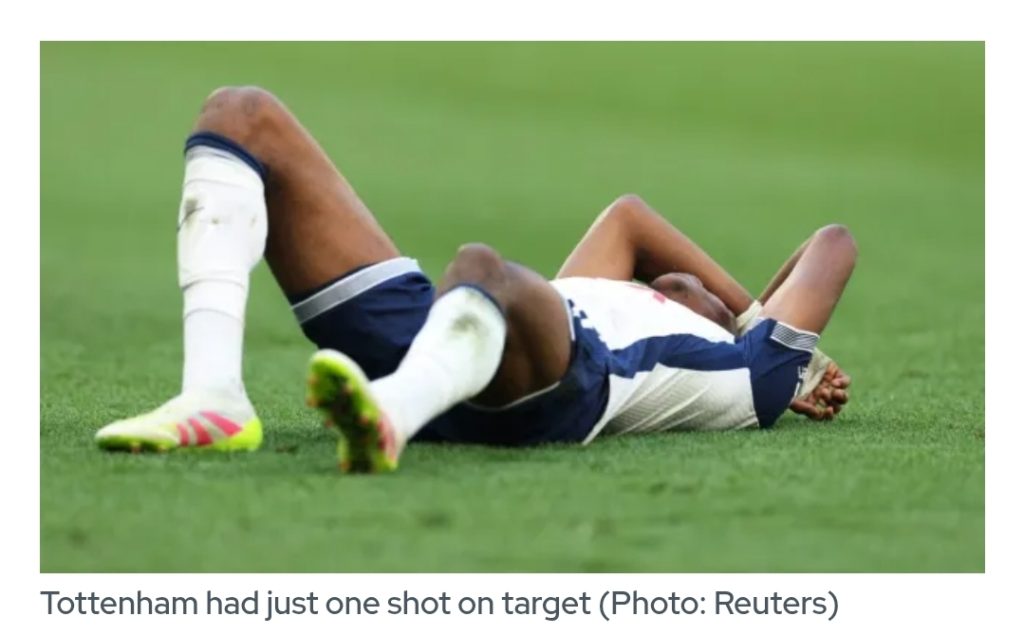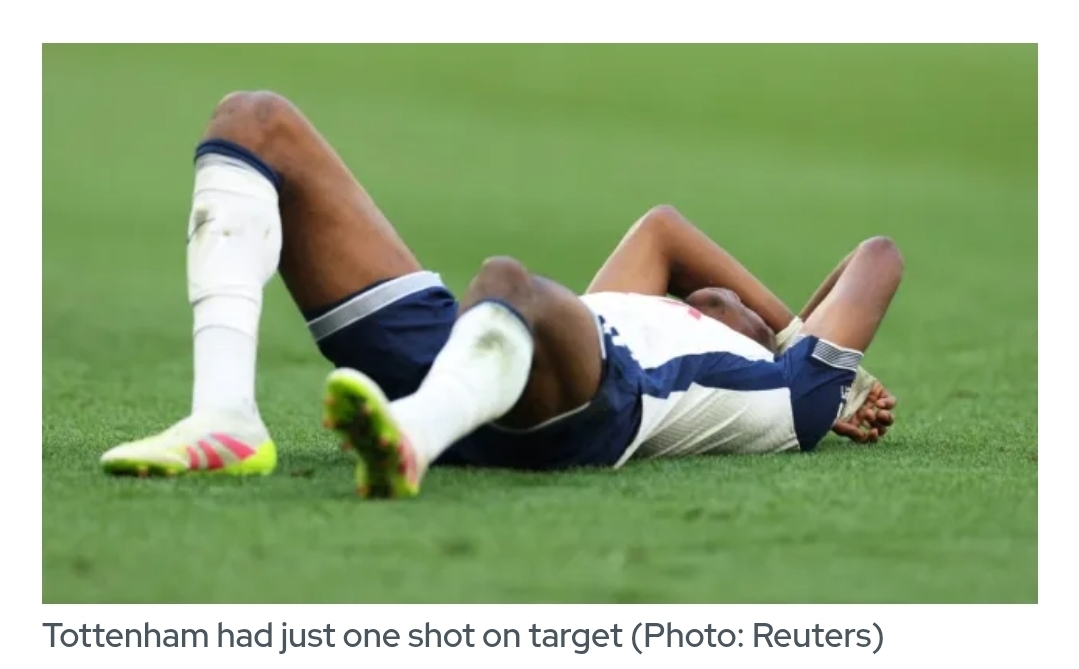The sun shone brightly over Tottenham Hotspur Stadium on Sunday afternoon, casting cruel illumination on a performance that plumbed new depths in Spurs’ worst Premier League campaign in living memory.
What should have been a celebratory end-of-season occasion instead became a grim exhibition of everything wrong with modern Tottenham – a club that has perfected the art of turning golden opportunities into abject humiliation.
Djed Spence’s inclusion symbolized the farcical nature of Tottenham’s current predicament. The full-back, whose career has stalled spectacularly since his £20 million move from Middlesbrough, epitomized the disjointed mess unfolding on the pitch.
His aimless wandering mirrored Tottenham’s broader identity crisis – a team without purpose, without cohesion, and most damningly, without the basic professionalism expected of Premier League footballers.
The statistics painted a picture of utter incompetence: one solitary shot on target compared to Palace’s ten; a 76% pass completion rate that would embarrass most Championship sides; a midfield bypassed with embarrassing ease.
Captain-for-the-day Rodrigo Bentancur’s first-half performance – four possessions lost, one tackle won, and a yellow card earned through sheer laziness rather than defensive necessity – set the tone for an afternoon that asked serious questions about this squad’s mentality.
The Great Tottenham Con
What makes this spectacle particularly galling is the financial reality underpinning it. Those 60,255 paying spectators didn’t witness a football match so much as participate in an elaborate con job.
With cheapest tickets priced at £49 and many exceeding £60, Tottenham continue to market their stadium experience as premium entertainment while serving up substandard fare that wouldn’t pass muster in League One.

Consider the human cost: birthdays celebrated in the shadow of apathy; anniversaries marked by regret; wide-eyed children attending their first match only to be initiated into the cruel reality of modern Spurs fandom.
For every tourist snapping photos of the dazzling stadium architecture, there were dozens of lifelong supporters questioning why they continue investing emotional and financial capital in a club that gives so little in return.
The financial numbers only deepen the insult. Tottenham’s matchday revenues regularly exceed £4 million per game – a figure that should guarantee certain minimum standards. Yet what fans receive is a product so disconnected from its price tag that it borders on fraudulent.
When even the most diehard supporters begin streaming for exits with five minutes remaining – serenaded by Palace fans asking “Why the f**k are you lot here?” – the club’s leadership should recognize they’ve breached the fundamental contract between team and supporter.
Tactical Bankruptcy Meets Psychological Collapse
Ange Postecoglou’s post-match bewilderment rang hollow after another tactical disasterclass. His refusal to introduce Richarlison or Dominic Solanke from the bench spoke volumes about where Tottenham’s priorities truly lie – and it’s not with the paying public.
The Australian’s “parallel worlds” explanation for Tottenham’s Jekyll-and-Hyde season doesn’t withstand scrutiny; this isn’t about competing commitments but fundamental failures in squad building, tactical flexibility, and man-management.
Palace’s Daniel Munoz enjoyed the freedom of Tottenham’s right flank, demonstrating what happens when competent organization meets tactical anarchy. That Postecoglou failed to use this match as a dry run for next week’s Europa League final against Manchester United – who deploy a similar 3-4-3 system – reveals either staggering short-sightedness or willful negligence. Either explanation should alarm Spurs supporters.
The psychological unraveling traces back to Postecoglou’s preseason trophy pledge – a promise that now hangs over him like an albatross. His single-minded pursuit of continental glory has come at catastrophic domestic cost, with Spurs losing four of six home league games following European fixtures. This isn’t rotation; it’s surrender.
That the club’s hierarchy has tolerated this league campaign – which would have become a genuine relegation battle had Leicester shown any semblance of competence – speaks volumes about their ambition.
Institutional Failure Laid Bare
Tottenham’s problems run deeper than one manager or one disastrous season. This is institutional failure on an epic scale – a club that has perfected the art of monetizing hope while delivering despair. Daniel Levy’s 23-year reign has produced a world-class stadium and consistent financial growth, but the footballing operation remains stuck in neutral.
Consider the damning historical context: this 20th league defeat equals the club’s worst tally since 1991-92 (when seasons contained 42 games). One win in their last ten Premier League matches represents their second such barren run this season alone. These aren’t blips but symptoms of chronic dysfunction – a club that has forgotten what elite performance looks like.
The Europa League final offers temporary salvation, but no single result can paper over these cracks. Whether Spurs lift the trophy or not, fundamental questions remain about:
- Recruitment strategies that produce bloated, unbalanced squads
- A culture that tolerates mediocrity as long as commercial revenues hold
- Leadership that prioritizes spreadsheet success over footballing achievement
- A disconnect between boardroom and matchgoing supporters that grows wider by the season
As Tottenham prepare for their Bilbao showdown, they do so as English football’s ultimate paradox – a financial powerhouse trapped in a sporting purgatory of their own making. The Europa League trophy would provide glorious respite, but it cannot mask the systemic issues plaguing this club.
For the 60,255 who endured Sunday’s debacle – and the thousands more who’ve suffered through this season’s other indignities – the club owes more than hollow promises.
It owes them a team that respects their commitment, a vision that extends beyond next week’s fixture, and leadership capable of bridging the chasm between commercial success and sporting achievement.
Until then, Tottenham Hotspur will remain English football’s most puzzling phenomenon – a club with all the resources to compete at the highest level, yet seemingly incapable of escaping its own self-destructive tendencies. The fans deserve better. The history demands better. The question is whether anyone at the club has the courage to make it happen.

